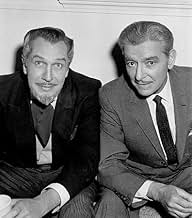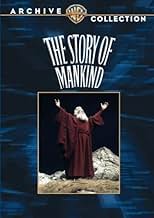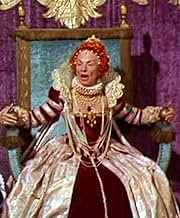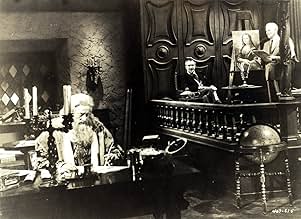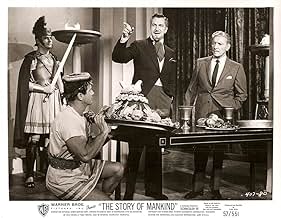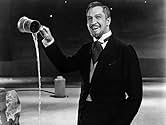L'uomo è entrato nell'era atomica, il giudice celeste decide di istruire un processo: a confrontarsi Belzebù e lo Spirito dell'Uomo, sul banco degli imputati l'intera storia dell'umanità, pe... Leggi tuttoL'uomo è entrato nell'era atomica, il giudice celeste decide di istruire un processo: a confrontarsi Belzebù e lo Spirito dell'Uomo, sul banco degli imputati l'intera storia dell'umanità, per stabilire se concedergli un'ultima possibilità.L'uomo è entrato nell'era atomica, il giudice celeste decide di istruire un processo: a confrontarsi Belzebù e lo Spirito dell'Uomo, sul banco degli imputati l'intera storia dell'umanità, per stabilire se concedergli un'ultima possibilità.
- Regia
- Sceneggiatura
- Star
Recensioni in evidenza
The film also is known for being the last film which featured all three of the Marx Brothers though they all have different roles. Chico plays a monk who is Christopher Columbus's confidante, Groucho euchres the Indians out of Manhattan island as Peter Minuit, and most astonishing of all, Harpo Marx as Sir Isaac Newton who discovers gravity when an apple conks him on the bean.
Holding all these portrayals together is a story where mankind itself is being judged. A super H Bomb is about to be discovered and let loose will do in the world's population. It's Judgement Day a coming.
But mankind has its advocates and detractors. Speaking for the prosecution is Old Scratch who's been bringing the worst out in man for centuries in the form of Vincent Price. But man has his good side as well and who better than Ronald Colman to demonstrate man at his most civilized best. Colman and Price plead their case before The Judge played by Cedric Hardwicke.
In those three individuals you have some of the finest speaking voices the English language ever knew. When the film is on them as they each bring out the exhibits for their case it's a pleasure to listen to. Then when the focus is on the individual stories, you want to scream in agony.
What was Irwin Allen driving at, I'm still trying to figure it out. Was he deliberately camping it up with some of these casting decisions? If it was satire, it just doesn't get off the ground.
This was Ronald Colman's farewell film and while it's hardly something I'd like to go out on, I can't think of any man who could have stated the case for civilization any better.
So when you see The Story of Mankind, fast forward through some of the exhibits and treasure every moment the advocates are before the judge.
Actually, the central premise isn't half-bad a tribunal in outer space(!), presided over by Sir Cedric Hardwicke, convenes to determine whether mankind should be allowed to go on living or else let it obliterate itself via the misuse of nuclear weapons! In fact, the opening half-hour or so is fairly decent but, as soon as one realizes that the film will be a constant parade of Hollywood stars stolidly appearing (portraying is hardly the correct term to use here) as famous historical figures who are subsequently given little of consequence to do it becomes a depressing, repetitive and altogether rather dull charade!
At least, the main roles of The Spirit Of Man (a suave and gracefully aged Ronald Colman in his last film) and Mr. Scratch aka The Devil (a typically genial turn by Vincent Price) are ideally filled something which, alas, can't be said of most of their colleagues: Hardwicke himself merely gets in a few inane phrases between Colman and Price's rebuttals, but, for good measure, we also have to contend with John Carradine (as a campily-dressed Pharaoh), Peter Lorre (as a thoroughly miserable Nero, which is ironic given that the role had often inspired actors towards hamminess!), Virginia Mayo (unrecognizable as Cleopatra), Hedy Lamarr (an embarrassingly miscast Joan of Arc), Dennis Hopper (as a wimpy Napoleon Bonaparte!) and, surely the weirdest casting choice of all, the Marx Brothers (appearing in their final team effort, albeit separately: Chico barely registers as a monk in the Christopher Columbus episode, Groucho incongruously appearing fully in character, with glasses and wisecracks intact[!], as obscure American Pilgrim Peter Minuit, and Harpo, ditto, as a mute and harp-playing Sir Isaac Newton)!!
The various re-enactments (amidst which Colman and Price are free to roam) display a rampant use of stock footage thus making the film seem more expensive than it actually is and naturally end with the present i.e. 1957 crisis; in hindsight, the script's constant reference to the "Super H-bomb" is amusing and dates the show more than anything else! At a mere 100 minutes, such an ambitious enterprise was doomed from the start and, indeed, it feels too much like a crash-course in World History (intercut with elementary bits of Philosophy). Perhaps, the kindest thing that can be said about THE STORY OF MANKIND is that, for better or worse, it did pave the way for Irwin Allen's heyday as a producer of star-studded Hollywood blockbusters.
The production values are hardly high art, but they are decent. The sets are okay, the costumes are interesting and the cinematography is not exceptional but not exactly cheap either. I liked the premise as well, and it started off decently with Sir Cedric Hardwicke presiding over things nicely. There is also some good performances. Ronald Colman gives far from his best performance, but he is very suave and convincing, Marie Antoinette is nicely coquettish and Agnes Moorhead chews the scenery with glee. It was also nice to see the Marx Brothers, Harpo and Chico aren't really that funny but Groucho is though there was the odd moment not to do with Groucho more to do with the writing and the way the characters were written that came across as more offensive than amusing. Best is Vincent Price, with his powerful voice and magnetic presence, he is gleefully wicked.
However, the direction falls flat as if it is unsure of which direction to go whether it wanted to be a history lesson or an exercise in camp. The dialogue is mostly absolutely abysmal, but it is so hard not to laugh at how bad it is. The film goes at an uneven pace with some segments faster than others or better acted and written. The characters are little more than stereotypes and caricatures and badly explored ones at that, and there are some unintentionally hilarious ideas incorporated into the story especially with Joan of Arc. I liked the leads and Moorhead and Groucho, but the rest of the cast are just bizarre. Peter Lorre though isn't too bad, perhaps too young and somewhat too effeminate too but there are some moments of unexpected poignancy, but Hedy Lamarr is woefully miscast as Joan of Arc and a very over-the-top Dennis Hopper does nothing with the role of Napolean.
Overall, The Story of Mankind is a mess, but it was worth watching and I personally wouldn't put it on my worst movies ever list. 4/10 Bethany Cox
The only "stars" of the film are Ronald Colman and Vincent Price, who serve as opposing sides to the argument on the worth of humankind. The movie is set at a celestial trial to determine whether to save mankind or let it destroy itself with its nuclear weapons. (This is an Atomic Age fable.) Colman represents mankind and defends its goodness throughout history. Price is the devil (Mr. Scratch) and reminds the court of the evil in human history.
The well-known actors and actresses only appear on-screen in cameos that last about a minute. They play famous historical figures whose stories serve to prove some point at the trial. Some stars are barely recognizable and some roles have no dialogue. The big names don't have screen time together, except for Price and Colman. (The Marx Bros. are even separated.)
The movie itself is really kind of a letdown. It seems obvious that the historical crowd scenes and action scenes are borrowed from other films, and the new scenes with the cast members are sometimes laughably under-produced. (Watch for the scene showing Joan of Arc's capture.) The mixing and matching is distracting and emphasizes the cheapness of the new footage. And, despite an impressive cast of accomplished Hollywood talent, the cameo performances are mostly terrible. (The highlight is Groucho Marx, putting his spin on the sale of Manhattan.)
As a history lesson, this film won't do. And as an entertainment, it falls pretty far short. The movie is still of interest for the cameos, and it's fun to play "Guess Who That Is" with other movie buffs in the room. But it's disappointing that all of these names couldn't have come together in a better movie. The premise could have been executed better, and I'd be interested in seeing a new attempt at such a star- studded history lesson.
Lo sapevi?
- QuizIrwin Allen managed to assemble his all-star cast by promising them they would only be filming for one day and that they would get paid $25,000 for doing so.
- BlooperThe cheap production values of this film resulted in many anachronisms. Some of the most obvious include: In ancient Greece, the hand of Plato is shown writing in cursive with a stylus, but he has no inkwell, and his shirtsleeve (on a toga?) looks more medieval or renaissance. In the next shot, Aristotle is surrounded by bubbling glass beakers filled with colored liquids, a la Victor Frankenstein's laboratory. The Indian who sells Manhattan sits in front of a Plains tribe tepee and wears a full Western war bonnet.
- Citazioni
Mr. Scratch: Then, came the red man, fighting for his very survival and the white man determined to take away this so-called god-given heritage, used the foulest of methods. Rather confusing, don't you think?
- ConnessioniEdited from La leggenda di Robin Hood (1938)
I più visti
Dettagli
- Data di uscita
- Paese di origine
- Lingue
- Celebre anche come
- The Story of Mankind
- Luoghi delle riprese
- Azienda produttrice
- Vedi altri crediti dell’azienda su IMDbPro
- Tempo di esecuzione
- 1h 40min(100 min)
- Proporzioni
- 1.66 : 1



